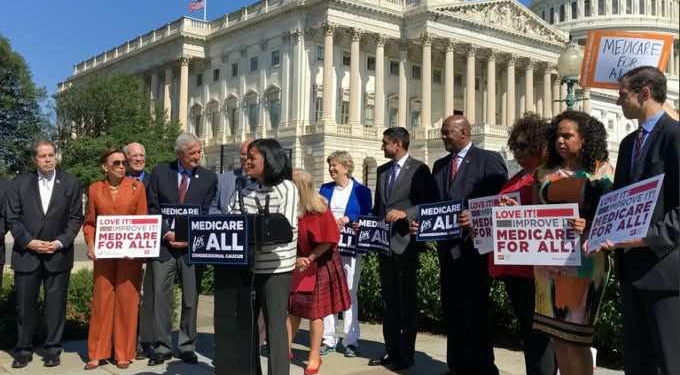By Jake Johnson, staff writer | Common Dreams

With the enthusiastic backing of America's largest nurses' union, consumer advocates, sustainable business groups, and the majority of the American public, 62 House Democrats on Thursday officially launched the Medicare for All Caucus, which will be devoted to closely examining the gritty policy specifics of single-payer while working toward one straightforward moral goal: guaranteeing every American “healthcare from the day they're born.”
“Healthcare cannot be a luxury that's only available for the wealthy and well-connected—it is a human right,” declared Rep. Pramila Jayapal (D-Wash.), who helped found the new caucus alongside Reps. Debbie Dingell (D-Mich.) and Keith Ellison (D-Minn.). “Medicare for All is the way forward.”
Watch the full launch event:
Martese Chism, a registered nurse and member of National Nurses United, applauded the formation of the Medicare for All Caucus in a speech at Thursday's event, calling it a necessary step toward the ultimate goal of rooting out America's disastrous for-profit system that is “failing tens of millions of people.”
“I worked for eight years in the dialysis unit at [Chicago's] Stroger hospital,” Chism said. “I saw firsthand how so many dialysis patients ended up in kidney failure because they were unable to afford the cost of healthcare. This is a disgrace, and does not need to happen in the richest country on the face of the earth.”
“It is time we have a system that treats healthcare as a right,” Chism concluded.
“As a dialysis nurse, I saw first hand how so many patients ended up in kidney failure because they could not afford the cost of healthcare. This is a disgrace,” Martese Chism RN, @NationalNurses
We urge Congress to pass #MedicareForAll & for all members to join the #M4ACaucus pic.twitter.com/9l1VJjVbd8
— The People's Summit (@pplsummit) July 19, 2018
According to recent polling data, most Americans—and more than 70 percent of Democratic voters—support Medicare for All.
As Public Citizen president Robert Weissman argued Thursday's event, the primary obstacle in the way of achieving a single-payer is not public opinion, but the entrenched interests of insurance and pharmaceutical companies.
“The problem is not a lack of solutions. We know what the solution is: Medicare for All,” Weissman said. “The problem is the influence and power of the hospitals and the drug companies and the for-profit insurance companies. That's the problem. And that is why the creation of this caucus is so vital. It's vital because it represents a turning point in our politics, where people power is now poised to defeat corporate power in the halls of Congress.”
“Millennials will help us, older people will help us, two-year-olds if they can talk will help us,” Weissman added. “Everybody agrees on this, except the vested interests that benefit from a rigged, flawed, cruel, and immoral system.”
While just 62 House Democrats signed on as original members of the Medicare for All Caucus (view a full list of the members here), that number is expected to swell rapidlyin the coming weeks, given that 122 Democrats are currently co-sponsoring the House Medicare for All bill, reintroduced by Rep. Ellison earlier this year.
Outlining the central mission of the new caucus in a series of tweets on Thursday, Jayapal wrote, “We want to make sure that everyone has a practical understanding of how we can make this system work.”
Health care costs are skyrocketing and we must act now.@FamiliesUSA estimates that annually 26,000 adults die due to lack of access to care. In Washington state, one in 10 people report they've delayed necessary care because of its cost. This isn't how it should be.
— Rep. Pramila Jayapal (@RepJayapal) July 19, 2018
“Our Medicare for All Caucus will help build the evidence base for Medicare for All,” Jayapal concluded. “We'll spread the word on everything from Medicare for All basics to financing to information on healthcare around the world. We will make sure members of Congress and their staff have the resources to move Medicare for All forward.”
This work is licensed under a Creative Commons Attribution-Share Alike 3.0 License





![Everything You Ever Wanted to Know About 9/11 Conspiracy Theory in Under 5 Minutes [VIDEO] | by James Corbett](https://consciouslifenews.com/wp-content/uploads/2018/09/911-a-conspiracy-theory-350x250.jpg)










